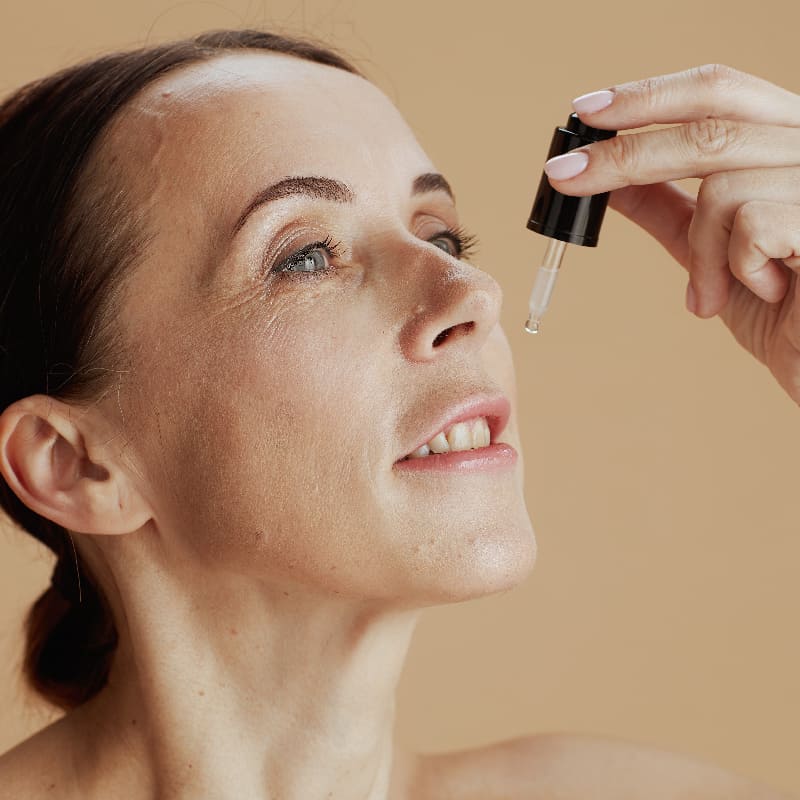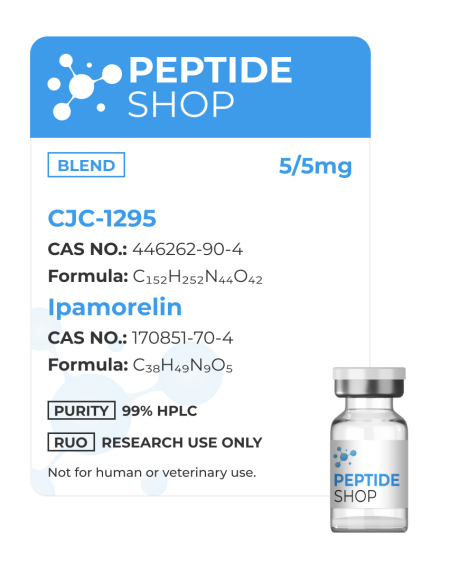-
CJC-1295, Ipamorelin $100.00
CJC-1295 and Ipamorelin peptide are often used in conjunction as their action is synergistic and more than doubly effective. PeptideShop.com offers this blend in a total quantity of 10mg (5mg each).
CJC-1295 Peptide
CJC-1295 is a synthetic hormone-releasing hormone analogue and growth hormone secretagogue. It was developed by ConjuChem Biotechnologies as a means to promote regulation and pulsatile GH secretion. GH therapy is an FDA approved way of treating its deficiencies, diseases such as Turner or Prader-Willi syndrome, idiopathic short stature etc.
The only problem with this approach to treatment is it might be problematic to determine the effectiveness of these therapies due to lacks of biological serum markers. CJC-1295 peptide was developed to mitigate these problems and uncover a more potent and measurable way of secreting GH without affecting its pulsatile nature.
Ipamorelin Peptide
Ipamorelin is also a growth hormone secretagogue, but it also acts as a ghrelin hormone secretagogue receptor agonist, as demonstrated in both in vitro and in vivo studies. Even though its effect is similar to that of CJC-1295, the interesting thing about Ipamorelin is that it does not raise ACTH (Adrenocorticotropic hormone), or cortisol levels for that matter, making it the first GHTP receptor agonist with selective GH release ability.
CJC-1295 And Ipamorelin Peptide Blend
Rather than administering one peptide or the other, more and more research is aimed at testing out the synergistic effect of these two peptides. Some studies showed a 3 or even 5 fold increase in growth hormone secretion increase!
Both CJC-1295 and Ipamorelin will stimulate the pituitary gland to increase GH production and release more hormones through the bloodstream. Animal studies also demonstrated significant ghrelin stimulation, resulting in food intake, fat deposition and muscle building control.
Despite seeing these beneficial results in both GH secretion and appetite regulation, this therapy is still not an FDA approved treatment, as most of our data comes from animal studies. Definitive human studies are needed before moving into the realm of human consumption.
References:
[rev_slider_vc alias="slider-02-1"]
Browse Categories
- Home
- Peptides
- Adipotide (FTPP)
- AICAR
- AOD9604
- BPC-157
- Cagrilintide
- Cerebrolysin
- Gonadorelin
- KPV
- Semaglutide
- Retatrutide
- CJC-1295
- CJC-1295 DAC
- Epithalon
- Ganirelix
- hGH Fragment 176-191
- Ipamorelin
- IGF-1 LR3
- Kisspeptin
- Liraglutide
- TB-500
- Sermorelin
- PT-141
- Oxytocin
- NAD+
- Semax
- Tesamorelin
- Teriparatide
- Thymosin Alpha-1
- Thymalin
- Triptorelin
- Vesugen (Bioregulator)
- Peptide Blends
- Cosmetic Peptides
- FAQ
- Blog
- Contact Us

 Anti Aging
Anti Aging Hair Growth
Hair Growth Muscle Growth
Muscle Growth Peptide Blends
Peptide Blends Peptide Supplies
Peptide Supplies Peptides
Peptides Skin
Skin Testosterone
Testosterone Weight Loss
Weight Loss